Delicious Techniques for Cooking Romaine Hearts
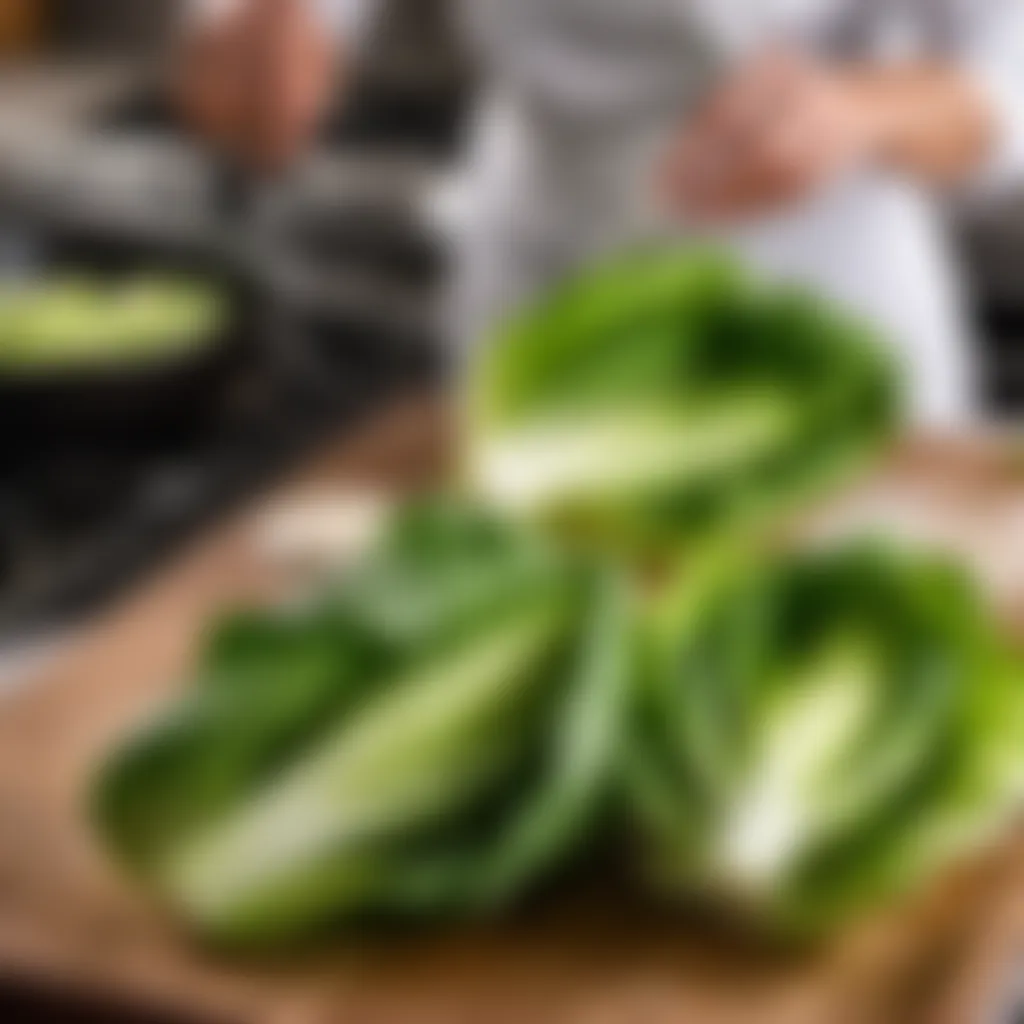
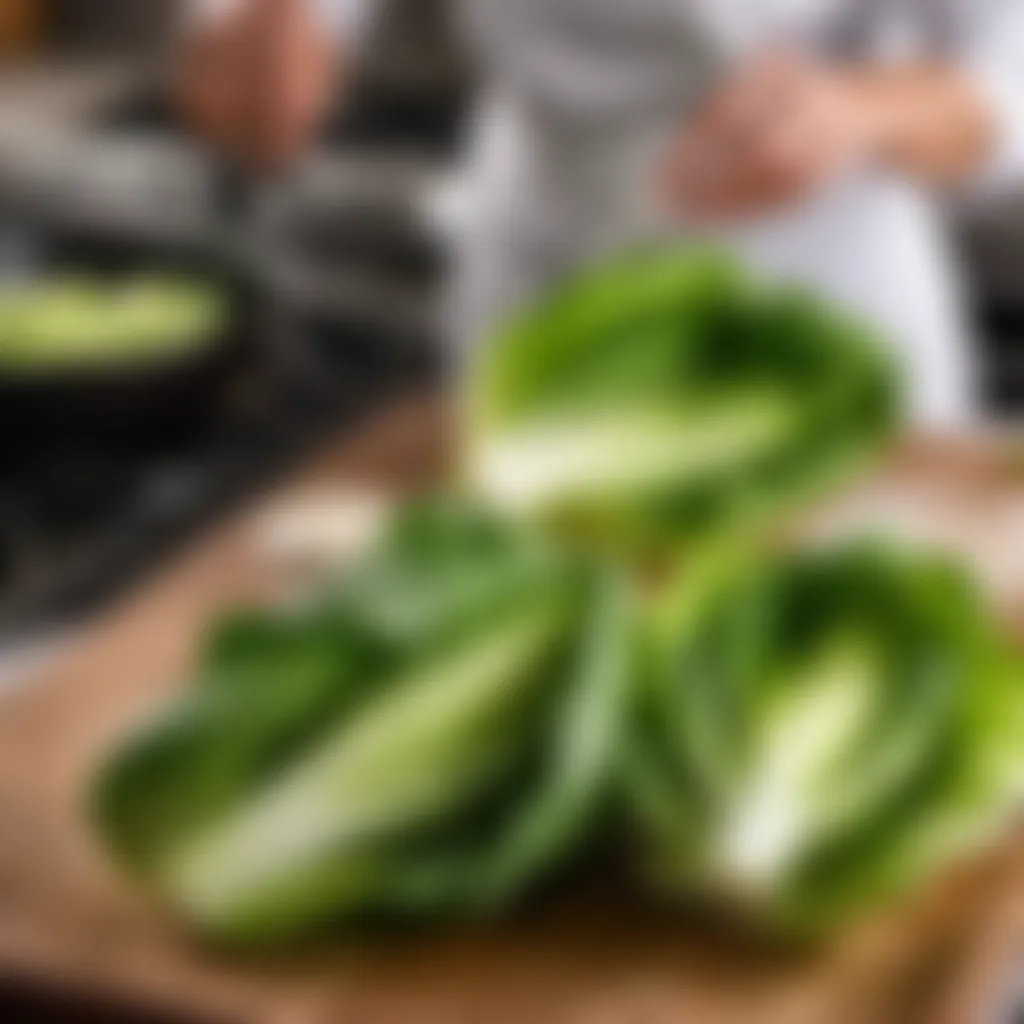
Intro
Cooking with Romaine hearts transforms simple meals into delightful culinary experiences. Known for their crisp texture and vibrant flavor, Romaine hearts can be more than just a salad green. This guide is tailored for home cooks who want to explore different cooking methods, discover nutritional benefits, and elevate their dishes. From the first slice to the last bite, the art of preparing Romaine hearts is not only straightforward but also incredibly rewarding.
Ingredients:
Here’s what you will need to get started:
- Romaine Hearts: 2-3 pieces, depending on serving size.
- Olive Oil: 2-3 tablespoons for grilling or sautéing.
- Salt: ½ teaspoon, preferably kosher salt.
- Freshly Ground Black Pepper: ¼ teaspoon to taste.
- Garlic: 2-3 cloves, minced (optional for flavor boost).
- Lemon Juice: 1 tablespoon for a zesty kick.
- Parmesan Cheese: ¼ cup, shaved or grated (optional).
- Balsamic Vinegar: Drizzle for serving (optional).
Make sure all ingredients are fresh; this can greatly enhance the taste of your dishes.
Preparation Steps:
- Wash the Romaine Hearts: Rinse under cold water to remove any dirt or debris. Make sure to separate the leaves gently.
- Trim the Ends: Cut about an inch off the base if they appear dry or wilted. This encourages fresh crispness.
- Dry the Leaves: Use a salad spinner or gently pat the leaves dry with a clean towel. Moisture can prevent proper sautéing or grilling.
- Cut in Half: Slice the Romaine hearts lengthwise for grilling or keep whole if you plan to roast them in the oven.
Technical Aspects:
Temperature Settings:
- Grilling: Preheat your grill or grill pan to medium-high, roughly 400-450°F (204-232°C).
- Sautéing: Heat a skillet over medium heat, letting the olive oil warm up.
- Oven Roasting: Preheat your oven to 425°F (218°C).
Timing Specifics:
- Grilling: Cook for about 3-5 minutes per side, or till grill marks appear and leaves become slightly charred.
- Sautéing: Allow around 5-7 minutes until the edges are tender.
- Oven Roasting: Roast for 10-15 minutes, turning halfway through for even cooking.
Cooking Process:
- Grilling Method:
Apply olive oil on the cut sides of the Romaine hearts. Place them on the grill, cut-side down. Grill for approximately 3-5 minutes or until grill marks are present, then flip and grill the other side. - Sautéing Method: In a hot skillet, add olive oil, then toss in minced garlic and let it sizzle for a minute before adding Romaine hearts. Stir frequently until leaves soften slightly.
- Oven Roasting Method:
Lay the Romaine hearts cut-side up on a baking sheet, brush with olive oil, and sprinkle salt and pepper. Roast until the leaves are tender and slightly golden.
Key Techniques:
- Monitor the cooking closely; Romaine hearts can go from perfectly cooked to overdone in the blink of an eye.
- Don’t overcrowd; Give space to the leaves for even cooking.
Troubleshooting Tips:
- If they char too quickly, lower the heat or move them to a cooler part of the grill.
- Overcooking can lead to soggy leaves, so keeping an eye on timing is crucial.
Keep in Mind: Overcooked Romaine hearts lose their crispness, so aim for a slight texture contrast between the edges and the centers.
Exploring these techniques not only enhances your culinary repertoire but also introduces a wonderful ingredient into your meals.
Feel free to mix in other ingredients as suggested to suit your taste, and enjoy elevating your dishes!
Understanding Romaine Hearts
Romaine hearts are an often overlooked gem in the world of leafy greens. They’re not just a crunchy addition to salads but come packed with benefits that can elevate your meals and boost your health. In this section, we’ll dive deep into understanding what makes Romaine hearts a smart choice in the kitchen, discussing their nutritional profile, how to select the best quality, and the practical considerations for incorporating them into your cooking.
Nutritional Profile
Vitamins and Minerals
Romaine hearts are rich in vitamins and minerals that play a crucial role in maintaining good health. They stand out due to their high levels of Vitamin A, which supports eye health, and Vitamin K, promoting bone health. This leafy green is also a good source of folate, helping with cell function and tissue growth. Furthermore, the minerals like potassium found in Romaine help maintain proper heart function.
A key characteristic of these vitamins and minerals is their bioavailability. This means your body can easily absorb them when you include Romaine in your diet. Their distinct advantage lies in how minimal processing is needed to retain these nutrients—fresh, raw Romaine hearts can pack a powerful punch in any dish.
Fiber Content
The fiber content found in Romaine hearts can significantly contribute to your overall dietary needs. One of the standout features is that it's almost a two-for-one benefit: it aids in digestion and promotes a sense of fullness. The unique property of the soluble fiber present can help lower cholesterol levels, making Romaine a smart choice for heart health.
Moreover, including Romaine hearts in your meals means incorporating a high-water content vegetable, making it a hydrating choice as well. The challenge, however, may arise from its low calorie count; some might overlook Romaine when seeking a hearty dish but it can be versatile when combined with other ingredients.
Low-Calorie Benefits
One of the most attractive aspects of Romaine hearts is their low-calorie nature. Just a cup of chopped Romaine contains about 15 calories, making it a fantastic base for those looking to manage caloric intake without sacrificing volume. This characteristic is particularly beneficial for adding bulk to salads or wraps without the guilt.
For anyone focused on weight management or simply looking for healthier alternatives, Romaine hearts play a pivotal role. They allow you to enjoy larger portions of food while still staying within your calorie goals. However, while they may be low in calories, it's crucial to pair them with nutrient-dense toppings to ensure you're getting the most nutrition possible.
Choosing Quality Romaine Hearts
Visual Indicators of Freshness
Picking the right Romaine is essential to your cooking experience. When selecting your romaine hearts, look for vibrant green leaves without any signs of wilting or browning. The leaves should have a crisp texture and a slight sheen, indicating freshness.
A significant point to remember is that freshness directly impacts taste. Fresh Romaine will have a pleasant, mild flavor compared to older greens, which might taste bitter or tough. Avoid any bunches with dark spots or sliminess, as these can be red flags about spoilage.
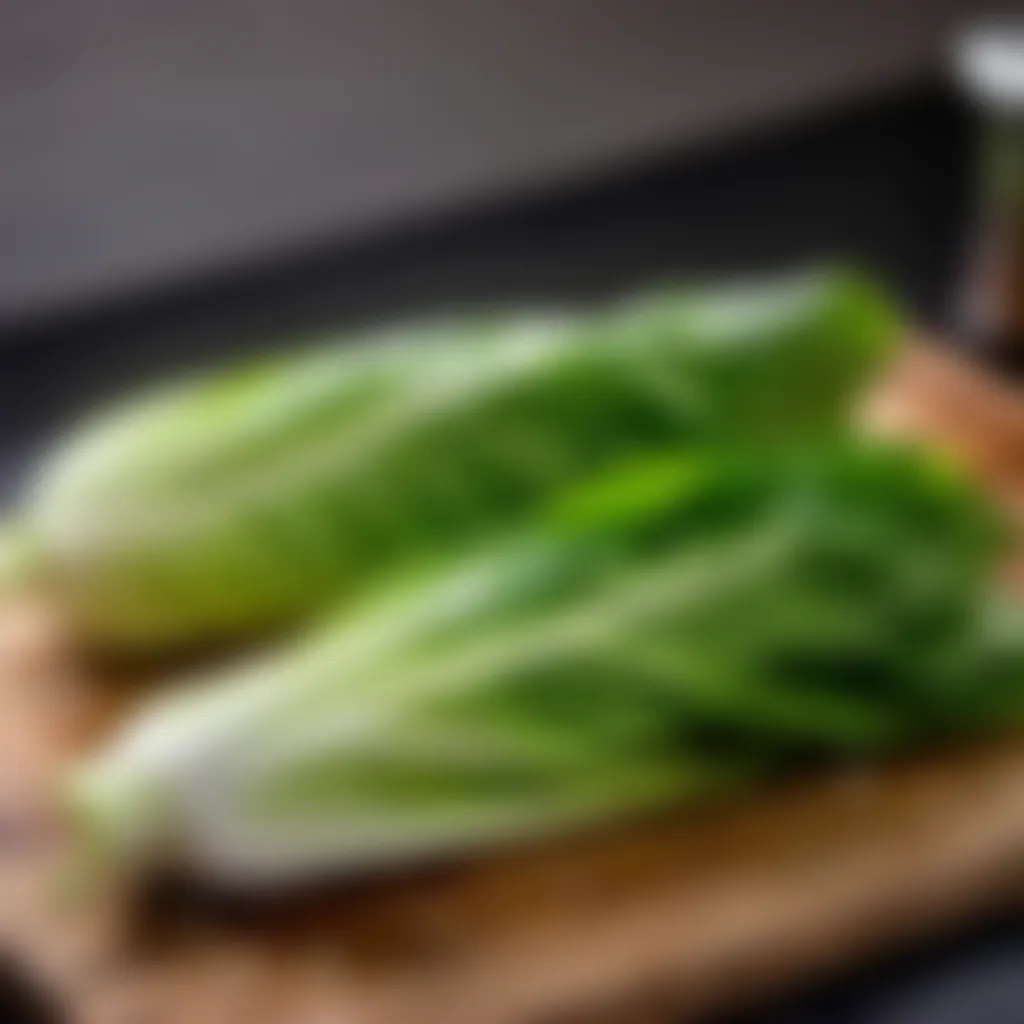
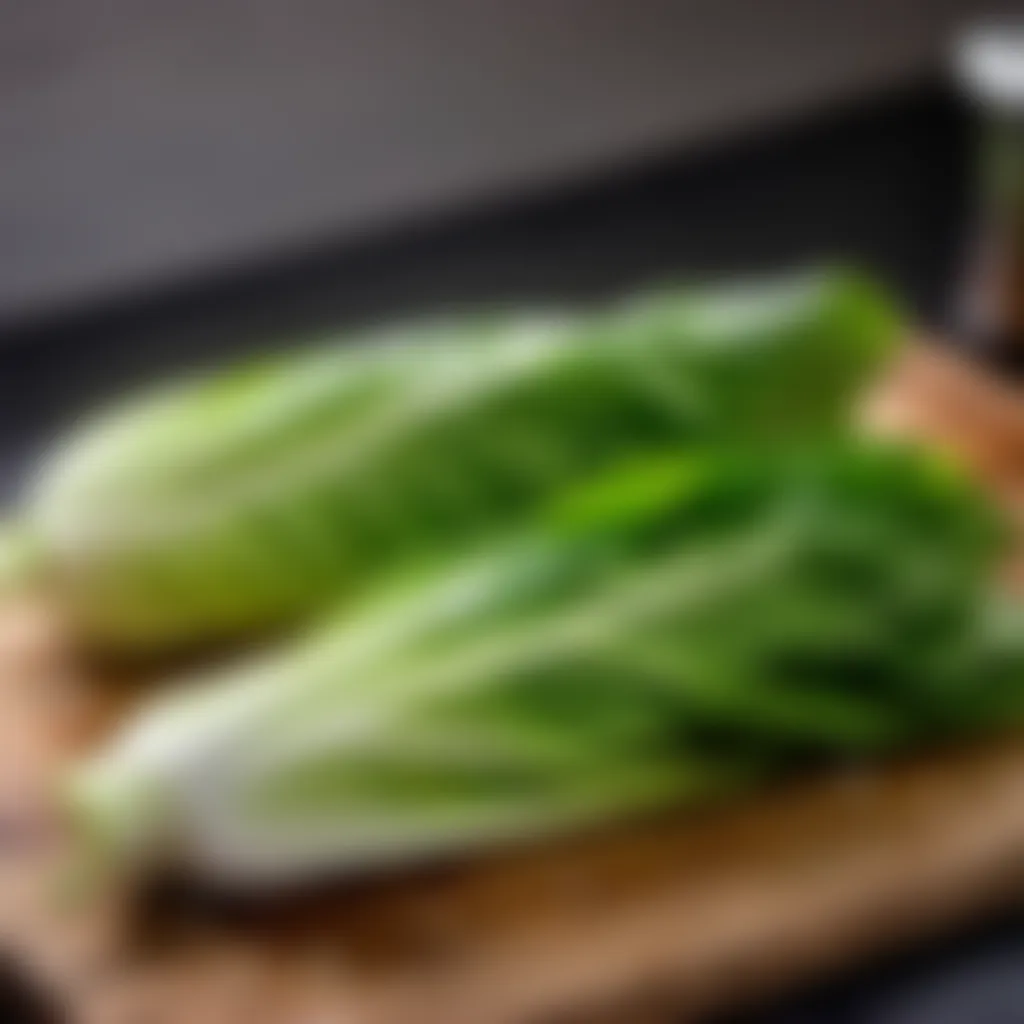
Seasonal Availability
When to buy Romaine can also affect its quality. While it is generally available year-round, spring and fall tend to offer the best flavors and textures. During these seasons, the growing conditions typically enhance the taste, leading to fresher and more appealing greens.
Buying seasonally can also be an opportunity to discover local produce and support nearby farms, which often yield better taste at a more competitive price.
Where to Buy
You can find Romaine hearts in various places, from grocery stores to farmers markets. Local markets can sometimes yield fresher selections compared to packaged goods found in supermarkets. Many farmers markets also provide access to organic options, which can be more flavorful due to less commercial treatment.
Ultimately, choosing where to shop can influence not just the quality but the price too. For those of you with access to community-supported agriculture (CSA) subscriptions, this is a splendid way to regularly obtain seasonal Romaine alongside other produce.
Preparation Techniques for Romaine Hearts
Preparing Romaine hearts properly is crucial in bringing out their best flavors and textures. These techniques set the stage for the cooking methods that follow. Knowing how to wash, dry, trim, and cut Romaine not only ensures cleanliness and safety but also enhances the overall presentation and enjoyment of the dish. Without a well-prepared base, even the finest cooking methods might fall flat. Therefore, let us dig into the essential preparation techniques and see how they contribute to a delightful culinary experience.
Washing and Drying
Effective Washing Methods
When it comes to washing Romaine hearts, ensuring that they are clean is a top priority. One should start by removing any loose outer leaves. Then, rinsing them under cold, running water helps to eliminate any dirt and debris. Using a produce brush can be particularly advantageous, as it allows you to scrub the leaves gently without damaging them. This method is more beneficial than soaking since dirt tends to settle in the leaves rather than floating away. Moreover, washing them effectively reduces any pesticide residue, making your meal healthier.
Drying Techniques
After washing, drying Romaine hearts properly is equally important. Excess moisture can lead to wilting or a soggy texture during cooking. A salad spinner is an excellent tool for drying, as it quickly removes water without bruising the leaves. Alternatively, gently patting them with a clean kitchen towel works as well. The unique feature of using a salad spinner lies in its efficiency and effectiveness, saving time in the kitchen. By achieving a crisp texture through proper drying, you elevate both the appearance and flavor of your dishes.
Preventing Wilt
Preventing wilt is essential to maintaining the crunch that Romaine hearts are known for. Once washed and dried, wrapping the hearts in a damp paper towel and placing them in a plastic storage bag in the fridge can extend their freshness. This method keeps them hydrated without causing them to be overly moist, which can lead to spoilage. It's a beneficial choice as it allows for longer storage without sacrificing quality, and when you're ready to use them, they’ll still have that refreshing crunch.
Trimming and Cutting
How to Trim for Grilling
When preparing Romaine hearts for grilling, trimming them correctly plays a vital role. Start by cutting the hearts in half lengthwise, which exposes their inner core to the heat and encourages a delightful char. Removing the base and any tough outer leaves enhances tenderness and makes the grilling process smoother. This method is popular as it maximizes flavor infusion during cooking while ensuring even grilling. With the outside charred and the inside remaining crisp, this technique brings out an impressive contrast in textures.
Slicing for Salads
Slicing Romaine hearts for salads requires a slightly different approach. Cutting them into bite-size pieces is key, as it allows for easy incorporation into mixed greens or other salad ingredients. A sharp knife is essential in avoiding bruising and ensuring cleaner cuts. This simple yet effective slicing promotes even dressing distribution, making every bite flavorful. The ease of use in salads makes this approach a go-to for many, as it allows for a refreshing, quick meal.
Creative Cuts for Presentation
To elevate the presentation of your dishes, creative cuts can make all the difference. Consider using diagonal slices, or even julienned cuts to create visual interest. By experimenting with various shapes, like ribbons or strips, you can turn a simple dish into an artful creation. These artistic cuts not only enhance plate appearance but can also affect how the flavors mingle, leading to a delightful eating experience. Making your dishes visually appealing is a vital part of cooking, and these creative cuts ensure that you impress on all fronts.
Cooking Methods for Romaine Hearts
Cooking methods for romaine hearts significantly expand how you can enjoy this green, adding not just different flavors but textures and presentations too. Whether you're looking to grill, sauté, or roast, each technique offers unique benefits that can elevate your dishes. Understanding these methods can transform the humble romaine into a star ingredient in your meals.
Grilling Romaine Hearts
Grilling romaine hearts introduces a smoky flavor that creates a delightful contrast to its crisp nature. This method can turn a salad into a grilled masterpiece, making it more intriguing for your dining table. Here’s how to make the most out of this technique:
Choosing the Right Grill
Choosing the right grill is fundamental for perfecting grilled romaine hearts. Gas grills are often seen as a go-to due to their ease and consistent temperatures. However, charcoal grills produce an unmatched smoky flavor that many find hard to resist. A unique feature of charcoal is how it can bring a richer taste, which elevates the natural sweetness of the romaine. Using a grill with a lid is also a plus, as it traps heat for more even cooking.
Temperature Control
Temperature control is key when grilling. Too hot, and you risk wilting the leaves or burning them, turning a crisp bite into something unpleasant. Ideally, keeping the grill at a medium heat allows the hearts to soften and get grill marks without losing their structure.
Grilling Time and Techniques
Grilling time and techniques can make a world of difference. Typically, cooking for about 2-4 minutes per cut side ensures you get those attractive grill marks and a light char. Adding a brief marination or seasoning just before grilling can enhance sweetness and sweetness.
Sautéing Romaine Hearts
Sautéing romaine hearts provides a quick and mouthwatering option that captures flavors while retaining some crispness. This method is noticeably fast and works conveniently for busy weeknights.
Essential Tools
Using the right tools while sautéing is vital. A good non-stick skillet prevents sticking and guarantees even cooking. Additionally, using a spatula helps in tossing the leaves without bruising them. An essential characteristic of these tools lies in their ability to handle high heat without damage.
Oil Selection
When it comes to oil selection, choices such as olive oil or avocado oil shine particularly well. Olive oil offers a peppery kick, enhancing the flavor, while avocado oil has a higher smoke point, making it excellent for sautéing. Choosing the right oil can not only enhance the taste but also influence health aspects, making it a beneficial selection for any recipe.
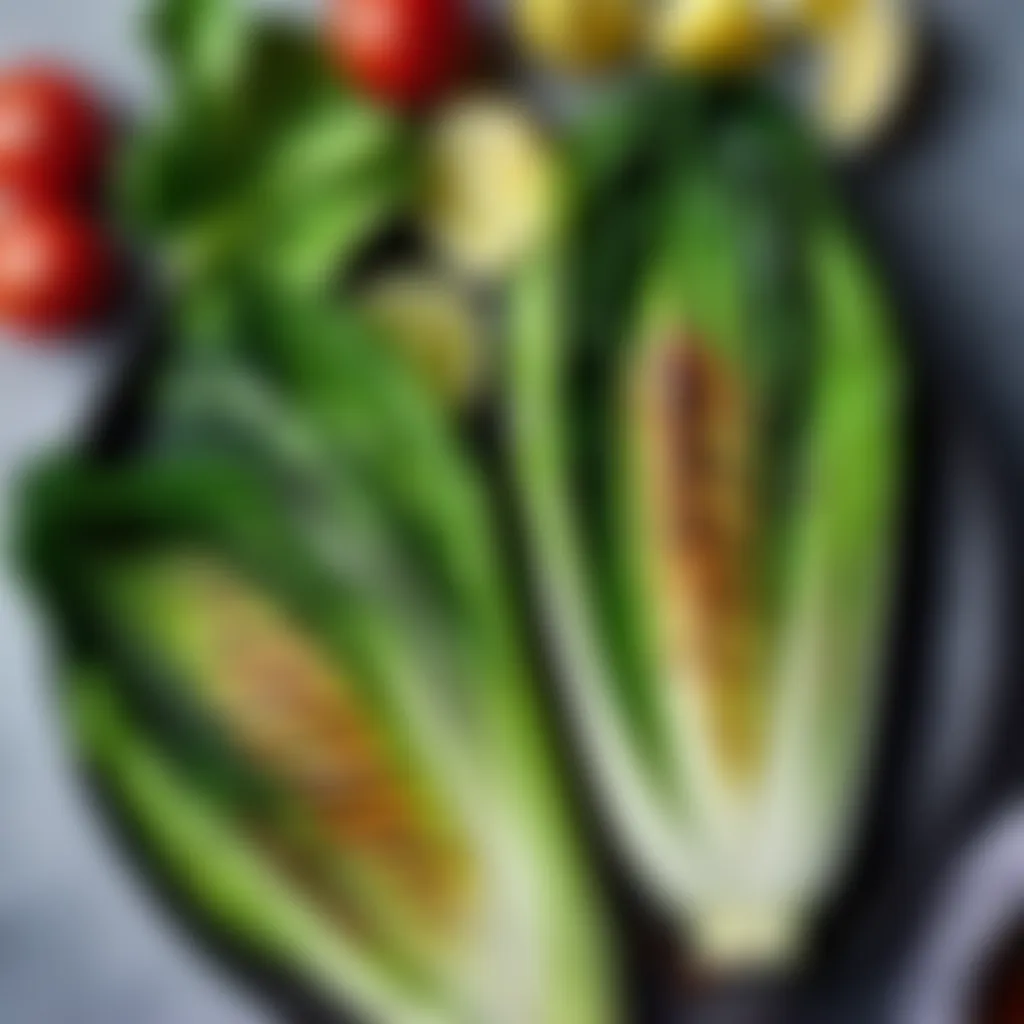
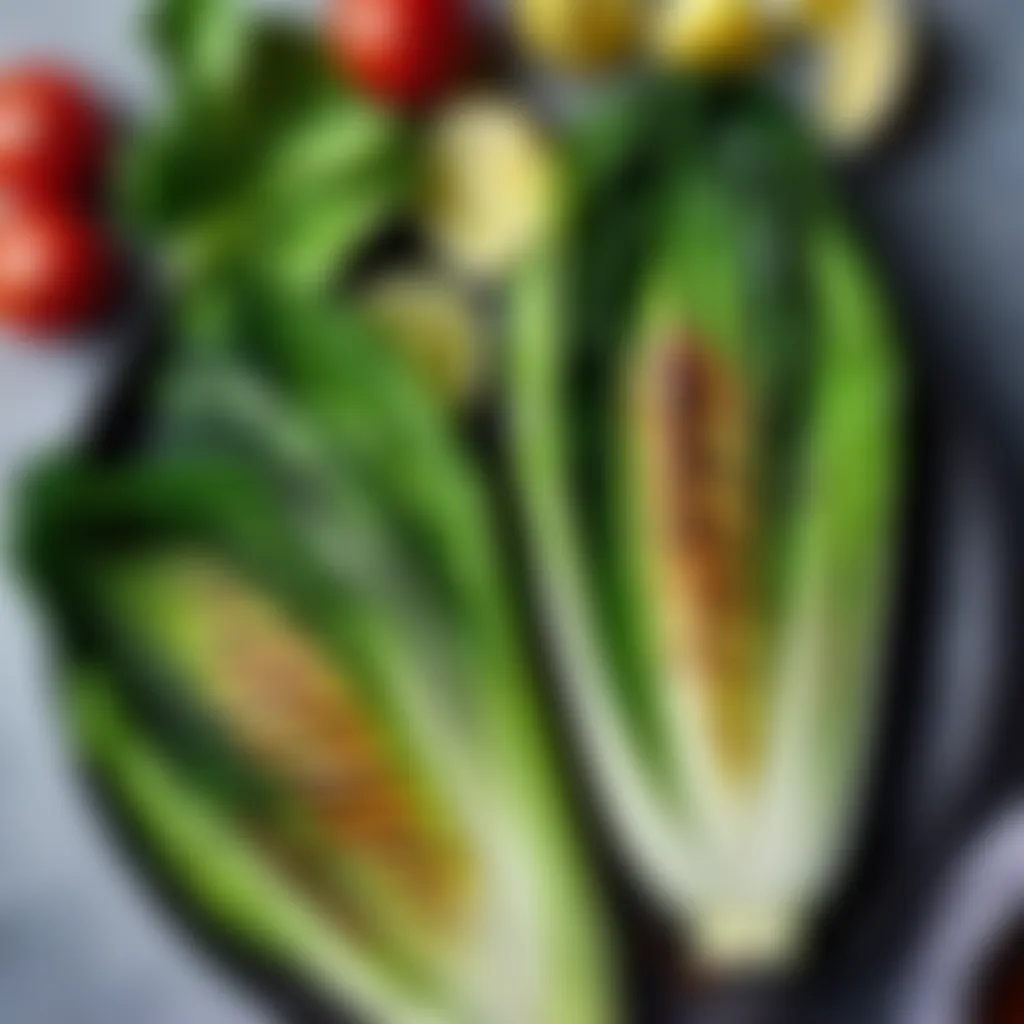
Flavor Enhancements
Flavor enhancements while sautéing can include garlic, red pepper flakes, or even lemon zest, all of which inject extra depth to your dish. Here, varying the spices allows you to tailor the meal according to your mood or occasion, making it exceptionally versatile.
Roasting Romaine Hearts
Roasting romaine hearts is a delightful method that brings out a whole new side to their flavor profile. Unlike the other methods, roasting develops a sweeter, more caramelized taste, which can be surprisingly delicious.
Preparing for the Oven
Preparing for the oven involves trimming the romaine and maybe tossing it lightly in oil and seasoning. Preheating the oven to around 400°F ensures the leaves cook without risking burning. The unique feature about roasting is how it turns mildly bitter flavors into sweetness through caramelization, enhancing the natural taste of the romaine.
Optimal Baking Time
Optimal baking time typically sits around 10-15 minutes, which allows for a nice balance of tenderness while retaining some crunch. Too long, and you risk a mushy texture, which isn't appealing. Finding that sweet spot will maximize enjoyment.
Combining with Other Vegetables
Combining with other vegetables during roasting can lead to a harmonious medley of flavors. Consider pairing with bell peppers or zucchini, which roast well alongside romaine, creating a colorful and flavorful side dish. This practice not only adds nutrition but also visual appeal, making your dish more special.
In summary, mastering various cooking methods for romaine hearts can open up a multitude of possibilities in your culinary journey.
These techniques each cater to different tastes, occasions, and preferences, ensuring this versatile green has a place on your plate in many forms.
Flavor Pairings and Ingredients
Understanding flavor pairings and ingredients is crucial when working with Romaine hearts. This leafy green possesses a mildly bitter yet refreshing flavor, allowing it to resonate easily with various profiles. Pairing Romaine with the right herbs, spices, and other ingredients not only elevates its basic taste but also brings forth a delightful culinary experience. Being aware of these combinations can help enhance meals, making them enjoyable for everyday family dining or special gatherings.
Herbs and Spices
Best Herbs for Romaine
When we consider the best herbs for Romaine hearts, basil and dill often come to mind. Both herbs offer bright, fragrant notes that complement the crispness of Romaine. Basil, in particular, brings a sweet yet slightly peppery flavor that can balance the natural bitterness of the leaves. Dill, with its fresh and somewhat citrusy essence, adds a refreshing touch that can make a simple salad extraordinary. These herbs can be included in dressings or sprinkled fresh on top.
The unique feature of these herbs lies in their ability to enhance flavors without overpowering them, making them an excellent choice. However, one may want to use these herbs thoughtfully. A heavy hand can take you from delightful to daggers in flavor real quick.
Spice Combinations
Now, let’s chat about spice combinations. The right blend can transform an otherwise plain dish into a commendable one. For Romaine hearts, consider pairing smoked paprika with a touch of garlic powder. The smokiness of paprika melds perfectly with the inherent characteristics of Romaine. Another combination worth mentioning is a pinch of cumin with chili powder, which can add a warm and slightly spicy profile, enhancing any cooked Romaine dish.
A unique feature of these spices is their adaptability; they can fit into various recipes seamlessly, whether you are grilling, roasting, or sautéing. The only downside to be mindful of is balancing the spices, as they can become overwhelming if added in excess.
Creating Unique Blends
Creating unique blends of herbs and spices is not just a fun activity; it’s engaging for the palate as well. Consider an herby vinaigrette made with olive oil, lemon juice, and a blend of parsley, cilantro, and chives. Such a mix gives an invigorating burst of flavors and can serve as a delightful dressing or marinade.
The beautiful aspect of crafting personalized blends lies in the creative freedom it allows. This practice encourages experimentation and can lead to discovering the perfect accompaniment for your Romaine dishes. Nonetheless, one should be cautious. Not every herb or spice pairs harmoniously, so it's wise to start with smaller quantities before going all in.
Complementary Ingredients
Cheeses and Dressings
Cheeses and dressings are game changers when it comes to elevating Romaine hearts. Feta cheese, with its crumbly texture and tangy flavor, complements the leaf's crispness beautifully. Additionally, a homemade vinaigrette, perhaps using apple cider vinegar and honey, can add a sweet zing to your salads.
The advantage of using these ingredients lies in their ability to add dimension to dishes without requiring much effort. A few crumbles of cheese and a splash of dressing can turn your meal from mundane to magnificent in no time. Just make sure to balance the flavors. Too much dressing can quickly drown out the delicate taste of Romaine.
Proteins to Pair
Adding proteins can transform a salad of Romaine hearts into a wholesome meal. Grilled chicken or shrimp can provide a satisfying depth. For something unconventional, try incorporating roasted chickpeas, which add a nutty flavor as well as texture.
These proteins not only enhance flavor but also increase the nutritional value of your dishes. One word of caution, though; ensure that the protein is not overcooked, especially when grilled, as this can lead to a chewy texture that feels off when paired with the soft crunch of Romaine.
Whole Grains and Legumes
Whole grains and legumes offer another layer of complexity when combined with Romaine hearts. Think quinoa or farro; these ingredients can introduce a chewy texture and nutty flavor that contrasts wonderfully with the crisp leaves. Adding lentils or black beans can also provide nutritional benefits, making your meal hearty and filling.
What’s admirable about these ingredients is their versatility in fitting into various dishes. They can be the heart of a vibrant salad or serve as an additional component in a grain bowl. However, ensure that the grains and legumes are well-seasoned, as plain versions might make the overall dish feel dull.
Incorporating an array of ingredients and observant flavor pairings allows home cooks to turn simple Romaine hearts into intricate and satisfying meals, showcasing the versatility and value of this often-overlooked vegetable.
Presenting Romaine Hearts
Presenting Romaine hearts adds that final touch to your culinary creation, making the dish not only palatable but also visually appealing. A well-presented plate catches the eye and tempts the taste buds even before the first bite. It’s not just about the food; it’s about creating an experience. Having fresh, crisp Romaine hearts at the center of your dish allows you to play with colors, textures, and flavors. This section details how to make that moment of enjoyment truly special, from practical plating techniques to dynamic serving suggestions.
Plating Techniques
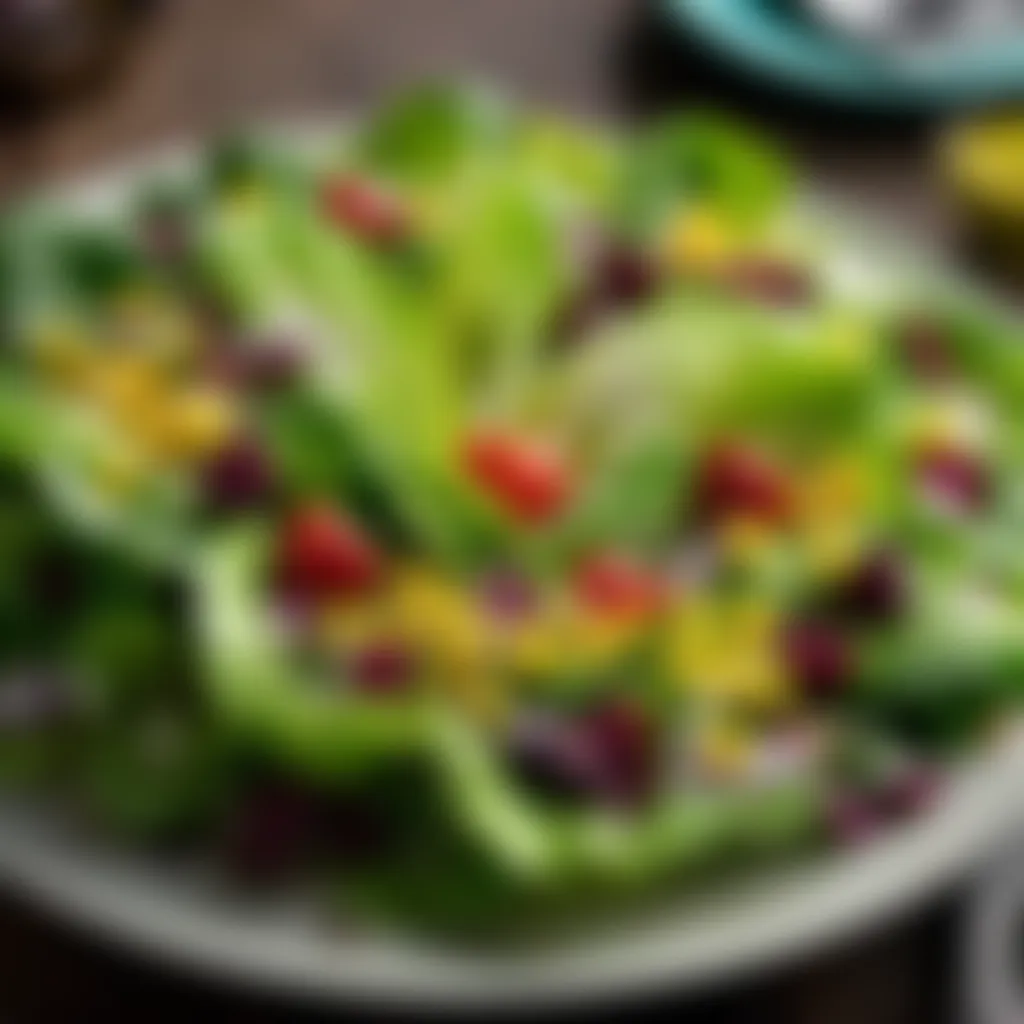
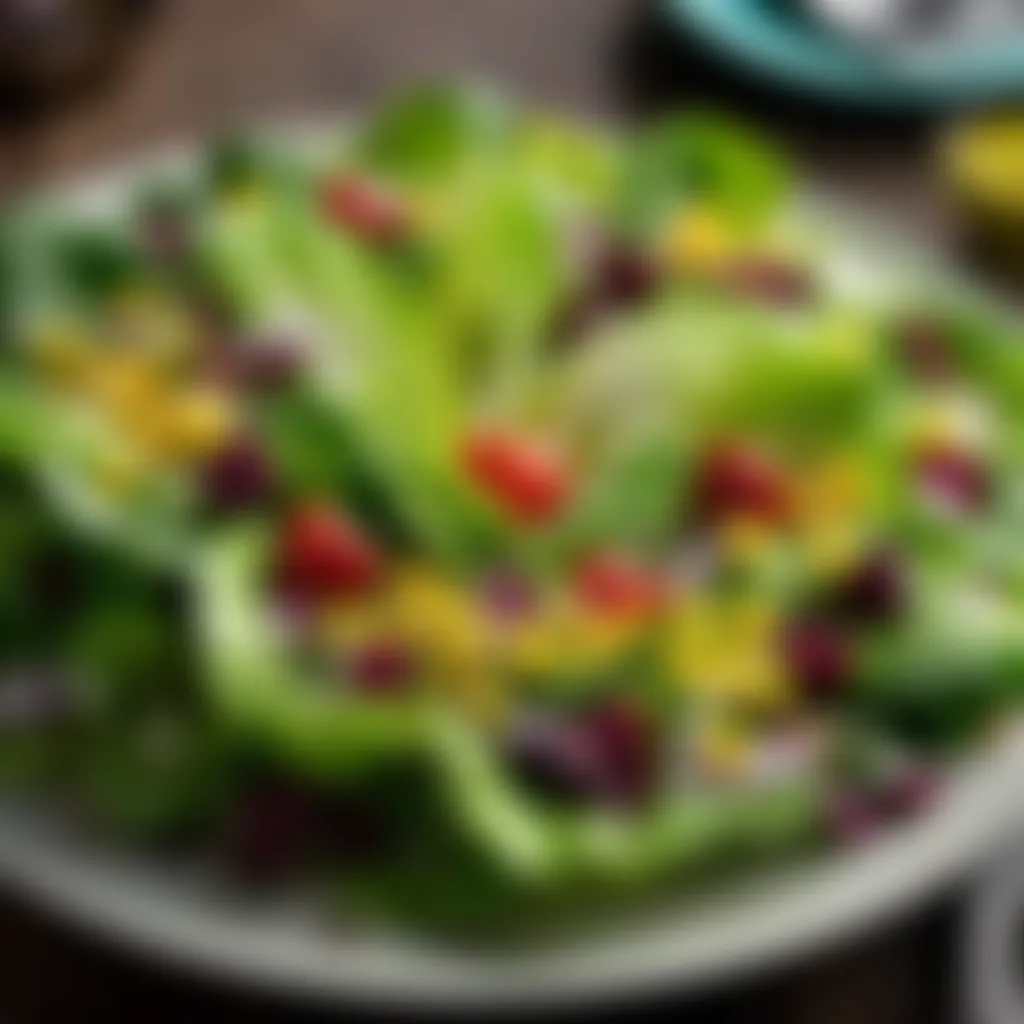
Visual Appeal Considerations
When it comes to presenting your Romaine hearts, visual appeal can't be underestimated. The arrangement plays a crucial role in making your dish inviting. Color balance is a key aspect here. For instance, pairing the vibrant green of Romaine with warm reds of cherry tomatoes or deep yellows of roasted peppers creates a stunning contrast that draws the eye. Unique plating ideas like stacking hearty Romaine leaves or fanning them out can give your dish an elegant look. The challenge lies in balancing aesthetics with functionality—ensuring that it’s easy to eat while looking good.
"You eat with your eyes first"—a saying highlighting the importance of appearance in food preparation.
Layering Flavors
Layering flavors is not just a culinary technique; it’s an art. In the context of Romaine hearts, it involves experimenting with various ingredients that complement each other and enhance the taste profile. The idea is to start with a base flavor—perhaps a creamy dressing layered beneath or lightly charred Romaine hearts that provide a smokey essence. Consider the toppings, such as crumbled feta or a sprinkle of sunflower seeds, to add a crunchy element on top. Not only does this method deepen the flavor but also introduces a delightful complexity, ensuring each bite is a surprise. However, balance is key. Overloading flavors can result in confused tastes, undermining the beauty of the Romaine.
Combining Textures
Combining textures brings an exciting element to your dish. Romaine hearts have a crisp, refreshing crunch that serves as an ideal base for various textures. Think about integrating smooth elements like avocado or creamy dressings alongside crunchy components such as nuts or crispy bacon bits. The contrast between the fresh, crisp Romaine and the soft or chewy items adds depth to the dining experience. A good mix of textures keeps diners engaged and adds to the satisfaction of each mouthful while offering variety, but keep in mind that too many textures can lead to chaos on the plate.
Serving Suggestions
Temperature Preferences
Understanding the importance of temperature preferences while serving Romaine is vital. While you might enjoy Romaine slightly chilled in salads, consider how warming it up through grilling or roasting alters the experience. Warm Romaine hearts can provide comfort, especially in cold seasons, while chilled offerings bring freshness in hot weather. Experimenting with temperature can elicit different sensory responses, so it's beneficial to keep the occasion and your audience in mind.
Pairing with Beverages
An often-overlooked aspect of meal presentation is the beverage pairing. Romaine hearts pair beautifully with light, crisp drinks. Think about a refreshing white wine or a sparkling water with citrus infusion. The brightness of a good wine can elevate the flavors of the dish, creating an entire dining experience rather than just a meal. Not only does this approach add layers of flavor, but it also enhances the overall eating quality. However, be cautious with heavier beverages, as they can overshadow the lighter notes of the Romaine.
Creative Serving Options
Serving Romaine hearts doesn’t have to be mundane. Consider creative options like a Romaine wrap, where leaves act as a healthy alternative to traditional tortillas. Stuffing them with various fillings can create a fun, interactive dining experience. Alternatively, creating a layered salad in a clear glass allows the beautiful colors and textures to shine through, encouraging guests to admire your work before diving in. However, not every creative option works for every setting; it’s essential to match the serving style with the theme of the meal.
By carefully considering these plating techniques and serving suggestions, you can transform simple Romaine hearts into a stunning centerpiece for your meals, catering both to the eyes and the palate.
Storing Leftover Romaine Hearts
Properly storing leftover Romaine hearts is not just about prolonging the life of this fresh veggie; it's a vital step in maintaining its flavor, texture, and nutritional value. There's nothing worse than reaching for what you thought was a crispy green delight only to find it wilted or, worse yet, spoiled. If you're looking to optimize your leftovers and reduce food waste, knowing the right methods to store your leftover Romaine can make all the difference.
Refrigeration Best Practices
Optimal Storage Conditions
When it comes to storing Romaine hearts, the right conditions can keep them at their peak for a longer time. Make sure your fridge is set at a consistent temperature, ideally between 34-38°F (1-3°C). This range helps slow down the aging process. That’s the sweet spot where bright green leaves remain crunchy and appealing. Leaving the leaves too exposed in a warmer area of the fridge can lead to rapid spoilage. It’s also beneficial to keep them away from fruits, especially apples and bananas, which emit ethylene gas, hastening the ripening process.
Tip: Tightly wrap your Romaine hearts with a damp paper towel before sealing them in a bag. This not only keeps moisture locked in but also forms a barrier against unwanted airflow, which can introduce bacteria.
Containers to Use
Choosing the right container is crucial for maintaining the integrity of your leftover Romaine. Airtight containers are your best bet because they prevent air from getting in and moisture from escaping. Clear containers help you see at a glance what’s inside, making careless pilfering less likely. Plus, if you use a glass container, you avoid potential health hazards associated with plastic leaching. Just ensure that, whatever container you use, it’s clean and dry before you stack in the Romaine hearts. It’s pretty common knowledge, but a quick rinse won’t hurt to eliminate any biofilm leftover from previous items.
Signs of Spoilage
Understanding the signs of spoilage is key to ensuring you don't bite into something that should have been tossed days ago. Wilted leaves are the first indicator that freshness is wavering. If the leaves are turning a brown color or developing mushy spots, that’s a red flag. An unpleasant smell is also a major warning sign. Storing in the fridge with good airflow helps, but it won't make up for poor quality at the start. Always listen to your senses when it comes to food. A little sniff can save you from unwanted surprises.
Creative Ways to Use Leftovers
Turning your leftover Romaine into something new and exciting can be an absolute game changer. This goes beyond just tossing it in the fridge and forgetting about it. Let's explore some innovative options for integrating those leftovers seamlessly into meals.
Integrating into New Dishes
Hoping to elevate your culinary game? Think about incorporating Romaine hearts into pasta dishes or stir-fries. The sturdy texture holds up well, and it brings an appealing crunch. Dicing the hearts into smaller pieces allows them to blend beautifully with grains or as a topping for baked casseroles. Not to mention, you’ll boost the nutritional value of your meals!
Refreshing Leftover Salads
Feeling uninspired? Revamp your leftover Romaine by creating a refreshing salad. Chop up leftover Romaine, toss in some cherry tomatoes, cucumbers, and a zesty dressing for a quick meal. You could even mix in some feta cheese or nuts for added crunch and protein. As herbs are in your lineup for the main dish, don’t hesitate to toss them into the salad as well!
Transforming into Smoothies
Who would’ve thought you could blend Romaine hearts into smoothies? The slight bitterness of greens blends away beautifully with fruits. Just toss a few leaves into your blender with bananas, some yogurt, and a splash of juice or milk. Before you know it, you’ll have a nutrient-rich drink that's ready in no time. Plus, you'll be packing in all those goodies without feeling guilty about throwing out perfectly good greens.
Storing leftover Romaine hearts effectively isn't just practical; it opens up a whole world of culinary possibilities. Being savvy with your storage and creativity will not only maximize your ingredients but also eliminate waste and keep meals fresh and exciting.
Culmination
The conclusion of any culinary exploration is not just a simple fare-thee-well; it's the moment to reflect on the essence of what has been learned throughout the journey of cooking with Romaine hearts. This leafy gem isn’t merely a salad base; it is a canvas for creativity, nutrition, and vibrant flavors. Understanding the beauty of Romaine hearts empowers us to elevate our meals—not just in taste, but also in nutritional value.
Recap of Key Techniques
To really round up all the bits and bobs we've discussed:
- Preparation is Key: Thoroughly washing and drying Romaine hearts, along with proper trimming, lays the foundation for delicious dishes.
- Diverse Cooking Methods: Whether grilling, sautéing, or roasting, each technique offers a unique twist, bringing out different textures and flavors that can dazzle any palate.
- Flavor Pairings Count: Knowing which herbs, spices, and other ingredients complement Romaine can transform a simple dish into a culinary delight. Remember, think beyond the usual!
- Presentation Matters: Employing clever plating techniques enhances not only the visual appeal of your dish but also invites your guests to enjoy it with their eyes first.
- Storage and Creativity with Leftovers: Learning how to store your Romaine hearts helps in minimizing waste, while also leaving room for delicious surprises in future meals.
Ultimately, the importance of this conclusion lies in its power to inspire and inform the cook. By revisiting these key techniques, not only can we craft outstanding meals that reflect our knowledge, but we also foster an appreciation for the versatility of Romaine hearts. Through experimentation and mindfulness, each cooking experience can lead to new discoveries—turning everyday eating into something truly exquisite.
"Cooking is not just about feeding the family; it's about creating memories on a plate."
With these insights in mind, it's time to roll up your sleeves and dive into the world of Romaine hearts—your culinary adventure awaits!







